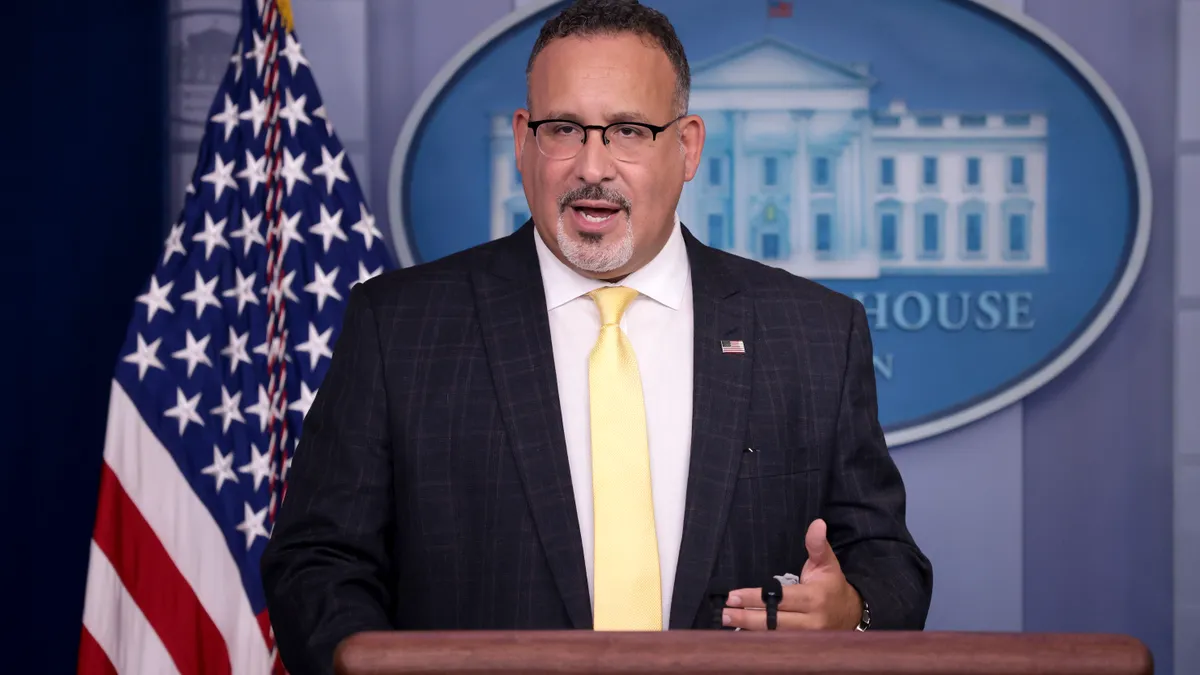Students whose colleges misled them would have an easier time seeking loan forgiveness from the federal government under a series of regulatory proposals the U.S. Department of Education released Wednesday.
One long-awaited rule would apply to the borrower defense to repayment process, which discharges loans for defrauded students. The proposed changes would also address flaws in the beleaguered Public Service Loan Forgiveness program, which clears the debt of borrowers who work in fields like teaching or government jobs and make a decade’s worth of qualifying payments. PSLF has suffered from notorious administrative problems, leading to a fraction of eligible borrowers securing loan relief.
The Biden administration aims for the new rules to take effect by July 1 next year. They would streamline procedures for seeking loan forgiveness, covering all pending and future claims as of that date.
The process for receiving borrower defense relief as of now is determined by a loan’s disbursement date. That’s because the prior two presidential administrations issued regulations that applied to a certain time period of loans. The new proposal would “remove the patchwork tied to the disbursement date of the loan,” an Ed Department official said in a call with reporters Wednesday.
The agency also said the borrower defense rule would make clearer what would be considered misconduct by a college and that would potentially fall under the regulation. The Ed Department’s proposal introduces a new category of such fraud — aggressive and deceptive recruitment.
Students who attended institutions that substantially misrepresented or omitted facts about themselves could also be eligible for loan forgiveness.
Colleges would be on the hook for the cost of such discharges, the Ed Department said.
The department also moved to try to protect borrowers during court proceedings. Colleges would not be allowed to require students to sign arbitration agreements that would block them from participating in a class-action lawsuit in the event they were defrauded. Further, institutions would have to inform the department if they used arbitration.
And colleges would not be able to force students to participate in an internal resolution process of a complaint before contacting an accreditor or government agency.
“We are committed to fixing a broken system. If a borrower qualifies for student loan relief, it shouldn’t take mountains of paperwork or a law degree to obtain it,” Education Secretary Miguel Cardona said in a statement. “Student loan benefits also should not be so hard to get that borrowers never actually benefit from them.”
Proposed changes to the PSLF program include allowing more payments to qualify toward its forgiveness threshold. About 127,000 borrowers with debts totaling more than $7 billion have had their debts removed under PSLF, largely because the Ed Department provided flexibility around the program’s requirements during the coronavirus pandemic. This waiver of the program’s requirements expires at the end of October.
Just a couple of years ago, nearly 99% of applicants for PSLF relief were denied, despite the first cohort of borrowers becoming eligible in 2007.
Other proposals released Wednesday would eliminate interest capitalization — when accrued interest is added to a loan's principal balance — except in cases where the law requires it. They would also expand discharge eligibility for borrowers with disabilities, use the closed-school discharge program to automatically forgive debts for many borrowers after institutions close, and improve rules allowing discharges for students whose colleges certified them as eligible for loans even though they were not.
The proposals now go to a 30-day comment period. The department intends to publish a final iteration of the rules in the fall.
Justin Draeger, president of the National Association of Student Financial Aid Administrators, in a statement praised the policy proposals, drawing attention to the provision that would mostly end interest capitalization.
“Some of the proposed rules need closer scrutiny though, and as we dig in, we're hoping to see proposals from the department that will make permanent changes to the Public Service Loan Forgiveness program that will ultimately make it easier for borrowers to receive their promised benefits,” Draeger said.
Career Education Colleges and Universities, an organization representing for-profit colleges, railed against the proposals. For-profit institutions have come under fire for misrepresentation, and much of the recent loan forgiveness has centered on students who attended them. Jason Altmire, the group’s president, said in a statement that the draft regulations lack due-process protections.
He said the department wants to discharge federal loans “en masse while hurting unfavored institutions and their students.”
“This is an unprecedented expansion of the department’s authority that was never contemplated by Congress and that will have substantial negative economic consequences on institutions and taxpayers,” Altmire said.
The Biden administration has aggressively pursued targeted loan forgiveness, and thus far has erased about $26 billion in debt for about 1.3 million borrowers. The Ed Department most recently settled a class-action lawsuit with defrauded students who alleged the agency had delayed loan relief. The department is forgiving $6 billion automatically for about 200,000 borrowers under the deal.
Editor’s note: This story has been updated with additional information and comment since it was first posted as a breaking news story.























